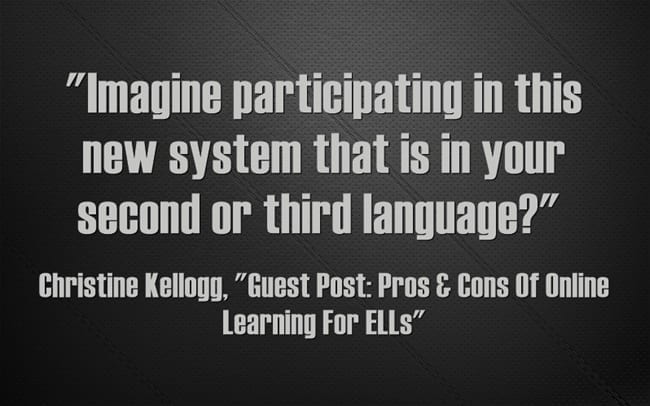Editor’s Note: I’ve been publishing a series of posts – both here and at Education Week – sharing teacher’s experiences dealing with the school closure crisis.
The first post appearing here was headlined Guest Post: My School Was Closed Because Of COVID-19 & Here Is A Report About Our Online Teaching.
Eva Buyuksimkesyan shares her experience in the second, Guest Post: Teaching An Istanbul English Class Online During The Time Of Corona.
Brenda Mendoza’s shared Guest Post: E-Learning for English Language Learners during Covid-19.
Gwendolyn Quadri’s wrote Guest Post: Teaching Newcomers Via Remote Learning.
Ieva Grauslys’ wrote Guest Post: “Distance teaching of ELLs – a week in reflection”
Today, it’s Christine Kellogg’s turn…..
Christine Kellogg is an English Learner Teacher at South Mecklenburg High School in Charlotte, North Carolina.
In the climate of online learning there are positives and negatives for students especially English language learners. English learners and students with unique needs are the most vulnerable to exclusion of online deliverables today. As educators, it is our responsibility to include these special learners and socially make personal connections to engage them and make them feel included in the online community of school.
With the consumption of social media, students are easily participating in online platforms for recreation and making connections with their peers. Conversely, how does that parallel to academics? Participation in online learning is more of a challenge for English learners as they navigate the platforms, directions and participate fully. Els are struggling to participate in learning experiences that are rich in cooperative learning practices and social interaction. (Walqui, 2012). This past week I had two experiences to support this idea of outlying students during this crisis. One of my students reached out to tell me that he doesn’t like the online learning and he misses talking with me. We had a conversation on the phone, and he seemed to appreciate the time to reconnect and have a sense of familiarity. Additionally, a parent of a student who is ESL and has unique needs reached out to me to ask me to video conference with her son who is struggling to understand his classes and directions. After talking with him, his mother, his sister and the family cat, he seemed calmer and open to participating in his online classes.
Our job is to educate comprehensively, and that means academically, socially and emotionally to meet the needs of our students who are traveling in uncharted waters. Imagine participating in this new system that is in your second or third language? Teachers are resourceful and creative. It takes thinking outside the box and meeting students wherever they are in their academic journey. There is no one path for students. We must provide personalized learning experiences especially for our most vulnerable students.
Here is a breakdown:
Pros
- Students can work at their own pace and time. This is a natural differentiation and modification for Els.
- Professors/teachers have time to reflect and prepare their deliverables. Content is more concise and direct which is great for Els.
- Our school has a schedule to show consistency and provide students online structure. “Go Sabres!” (Mr. Starnes,principal, South Mecklenburg High School) and our school has consistent staff meetings and department meetings.
- School support staff in place and readily available for students for any needs including meals.
- Students receiving constant feedback and connections with their teachers to feel included.
Cons
- Lack of real interaction with teachers and peers which is a basic human need to feel connected and part of a community and important for learning experiences. (Maslow,2020).
- Struggles with directions in English and navigating online platforms and applications with a learning curve.
- Isolation breeds loneliness and missing a life in a school building.
- Family obligations and possible non-supports for academic learning.
- Fear of failure in a new system of learning and a new country.
Sending appreciation for all stakeholders today making a difference!
References
Maslow’s Hierarchy of Needs. (2020, March 5). Retrieved from https://www.learning-theories.com/maslows-hierarchy-of-needs.html
South Mecklenburg High School. (n.d.). Retrieved from https://schools.cms.k12.nc.us/southmecklenburgHS/Pages/Default.aspx
Walqui Aída, & Lier, L. V. (2010). Scaffolding the academic success of adolescent English language learners: a pedagogy of promise. San Francisco, CA: WestEd.




Recent Comments